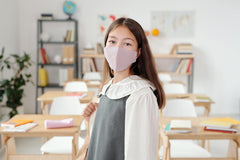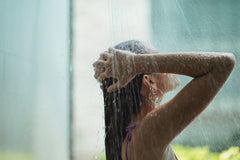FluShields Advises On How To Stay Safe From Wildfire Smoke
 Photo by Vladyslav Dukhin from Pexels
Photo by Vladyslav Dukhin from Pexels
When the wildfires spread near you, smoke will spread out to your neighborhood. But why do people have to be wary of the smoke and not just the fire ? That's mainly because wildfire smoke is a combination of gasses and small particles from burning trees and plants, and other materials which is consumed by fire. Wildfire smoke may cause anybody ill, but particularly at risk are people with asthma, chronic obstructive pulmonary disease ( COPD), or cardiac disease, and infants, pregnant women, and the respondent.
Wildfire smoke causes suffering, like health issues, far beyond the fire zone. To help protect yourself from wildfire smoke, we've got important facts and ideas regarding how smoke affects your health and how can you probably protect yourself from it.
The health implications of wildfire smoke are not well known, and emissions vary in several respects from other air contamination that has been found to cause disease. Yet, wildfire smoke has been related to severe health issues in infants. Several studies state that exposure to smoke may have long-term health effects for infants, but further research on the topic is still required. "Wildfire will cause damage to the developing lungs in infants that they will never recover from.
Good news: You can better protect yourself by wearing an N95 respirator mask: Get your N95 respirator masks for the whole family today.
The risks are higher for people who smoke and prefer to live in communities already prone to elevated levels of particulate emissions. According to a 2017 report, elderly people who smoked or still smoke are three times more likely to be treated for lung problems inhaling wildfire smoke. In addition, Francesca Dominici, professor of biostatistics at Harvard and author of the report, said, "The under-represented minorities are facing a significantly higher health risk from emissions and wildfire smoke and now COVID." The coronavirus pandemic, which has impacted ethnic minorities more, brings even more issues.
A new survey of Montana people proposed a long tail for susceptibility to wildfire smoke. "Decades of studies have found that increased exposure to air pollution is associated with a variety of adverse health effects, including weakened immune systems," said Dr. Landguth.
Given these circumstances, can you protect yourself?
👇 FluShields donates 3% of every order you place. You can top, round up, or give as much as you fancy at checkout. Our team and our customers like you are proud to have...
Click the tiny info button for details 👆
The C.D.C. advises restricting exposure to smoke by having the windows and doors closed and the air conditioners operating in recirculation mode so that the air is not pulled into the house. Portable air purifiers are also recommended, but they require power, such as air conditioners. If power is shut off, as happened in California, these choices are limited. They recommend to stop frying food, which can raise indoor smoke, and wear a N 95 face mask even indoors at all times.
Experts agree that it is highly essential to reduce cigarettes or stop smoking all together during wildfire. They also advocate avoiding strenuous physical activities such as lawn activity or mowing while the weather is low. When outside, well-fitted N95 masks are recommended at all times.
Any do-it-yourself options are possible, Dr. Henderson said, adding that masks made of various layers of fabrics, "particularly closely woven cotton and silk together," can provide "pretty good filtration" if tight to the face. So, what's the safest way to shield yourself in a smoke-filled environment? Dr. Dominici said the issue was a complicated one. Leaving the area before the smoke settles might be the best option, but many people don't have the opportunity to escape or the privilege of deciding whether to work outdoors.
Take Advantage of Our Loyalty Rewards Program & Save!
So, in order to prevent hazardous effects on you and your family's health, here are some preventive and precautionary measures you should take before, during, and after a wildfire takes place.
Preparing for a Wildfire
- Know your community’s evacuation plans and stock N95 / KN95 face masks in your house to be able to use them immediately when required.
- Find several ways to leave your area. You need to be familiar with various escape routes in your area once a wildfire happens.
- Drive the evacuation routes and find shelter locations. It might be best for you and your family to evacuate the area near the wildfire and find a safe place to stay.
- Have a plan for pets and livestock. You might need stock for emergency purposes. Securing your livestock might help you on the long run.
- Gather emergency supplies, such as respirators, face masks, goggles and face shields
- A respirator filters out smoke or ash until you can breathe it in. You need to choose a suitable respirator for you and your family. An N95 respirator mask might be appropriate for this situation.
- Choose a close room that can filter the smoke coming from your outdoors and set up an air purifier or air conditioner to keep your room cleaner and safer for you to breathe.
- Keep track of fires near you so you can be ready.
- AirNow’s “Fires: Current Conditions page” has a map of fires throughout North America.
- NOAA’s “Fire weather outlook” page maps fire watches and warnings.
- Listen to the Emergency Alert System (EAS) and National Oceanic and Atmospheric Administration (NOAA) Weather Radio for emergency alerts.
During Wildfire
- Evacuate safely.
- Find out what could happen to you
- Make a disaster plan with your family
- Complete the evacuation checklist
- Practice your plan once a month
- Stay calm during power outages and have enough candles ready in an emergency
- wear your N95 mask all day inside and outside until you evacuate
After Wildfire
- Continue to check air quality reports
- Wildfires leave behind a lot of ash that can irritate your eyes, nose, or skin and cause coughing and other health effects.
- Protect yourself against ash when you clean up. Wear gloves, long-sleeved shirts, long pants, and shoes and socks to protect your skin. Wear goggles to protect your eyes.
- Wash off any ash that gets on your skin or in your eyes or mouth as soon as you can.
- Children should not do any cleanup work.
- Limit how much ash you breathe in by wearing a face mask with carbon activated PM 2.5 filters. A respirator is a mask that fits tightly to your face to filter out ash before you can breathe it in. You must wear a respirator correctly. If you have heart or lung disease ask your doctor if it is safe for you to wear a respirator.
- Pay attention to any health symptoms if you or your children have asthma, COPD, heart disease, or are pregnant. Get medical help if you need it.
Those at greater risk for wildfire smoke effects include children under 18 years of age, pregnant mothers, adults 65 years of age and older, people with health problems like asthma, diabetes, and lung disease, people of lower socioeconomic status, others who are immunocompromised or taking immunosuppressive medications, and outdoor personnel.
Good news: You can better protect yourself by wearing an N95 respirator mask: Get your N95 respirator masks for the whole family today.
Disclaimer: Please note that we can only pass on general information and cannot make any guarantees or be liable for any consequences of your decision making or behavior. Use good common sense and ask your healthcare provider or physician for advice.
Thanks for stopping by. Please leave your comments, ideas, or feedback below so we can continue to provide you with great content.





